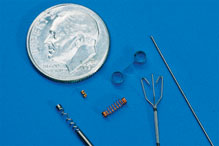As manufacturing continues to experience growth, so has the automotive industry. In recent months, the auto industry has seen stronger sales and more sustained recovery, according to this article by theDetroit Free Press. With increased sales comes an increased demand for conflict minerals disclosure.
The use of “conflict minerals” has affected all manufacturing industries, and will be in full effect by the end of 2013. Specifically, the conflict minerals’ requirements are outlined in the Dodd-Frank Wall Street Reform, created by the U.S. SEC. They refer to the prohibition of use of minerals and materials from “conflict” areas, more precisely the Democratic Republic of Congo. The minerals in question—tin, tungsten, tantalum, and gold—are restricted from use in American supply chains. According to this article, manufacturers in areas such as the electronics or automotive fields will need to accurately report whether or not these conflict minerals appear in their supply chain.
When it comes to the auto industry, auto manufacturers and other manufacturers in the automotive supply chain, such as us here at Exacto Spring, now need to confirm where the materials are being sourced from. Since auto sales have increased, there has been more of a demand of these reports. According to this article from Automotive News, the conflict minerals’ ruling has forced those in the auto industry to review their supply chain in a whole new view. Why? As stated in that article, those materials are used in a variety of automotive products, “causing a need for the supply chain to get into the data and reach out to suppliers.”
Here at Exacto Spring, we have been busy providing customers letters stating where we have received our materials. This is something that is happening up and down the supply chain, and with a higher production of cars, is something affecting all those in the auto industry. Whether or not you’re involved in the auto industry, it’s still pertinent in today’s manufacturing world to ensure your materials are conflict-free.




